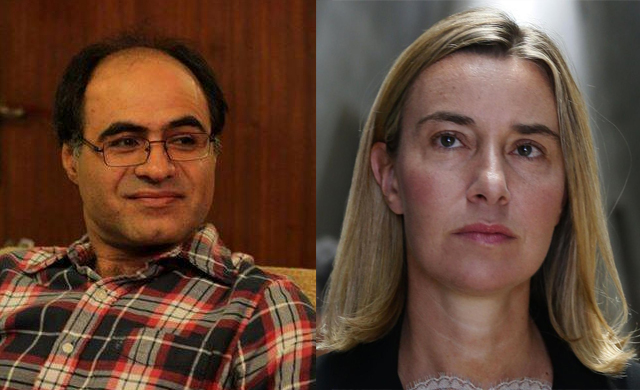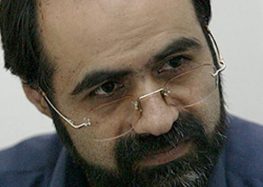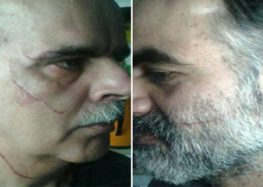EU Must Not Ignore Iran’s Human Rights Record, Says Former Political Prisoner

“Do not forget the spilt blood of Iranian youths or the young and old prisoners suffering in small and large prisons in this country when you are negotiating huge profitable deals with senior Iranian officials.”
Saeed Razavi Faghih, a reformist journalist who was released from Evin Prison on April 6, 2016 after serving two years for his political beliefs, has issued an open letter urging the European Union’s foreign policy chief, Federica Mogherini, to not “sacrifice human rights for commercial greed” during her April 16, 2016 trip to Tehran.
Mogherini’s one-day trip was seen as yet another sign of warming relations between Iran and the EU following the signing of the nuclear deal by Iran and world powers in July 2015.
The International Campaign for Human Rights in Iran has provided the first English translation (links added for context) of the letter, which was also addressed to Iranian President Hassan Rouhani.
The letter was first published in Persian on April 17, 2016 by Saham News, which is affiliated with Mehdi Karroubi, an opposition leader who has been held under house arrest since 2011 for his role in the Green Movement protests against the disputed victory of Mahmoud Ahmadinejad in the 2009 Iranian presidential election.
“In the past two decades, at the very least, the state of Iran has been the biggest danger to no nation other than Iran itself,” wrote Razavi Faghih. “The great number of inmates in Iran’s prisons, representing [individuals belonging to different trades] and [those who belong to different] schools of thought and various political and social groups, is an indication of the daily, deepening divide between the state and the people,” he added.
In reference to Iran’s political prisoners, Razavi Faghih wrote: “I do not want you to demand reparations for the blood that has been spilt unjustly, or even insist on ending the house arrest of the innocent and beloved leaders of the (2009) Green Movement, or criticize the ban on printing the image of [the reformist former president Mohammad Khatami], the most well-liked president in the history of Iran.”
“I do not even want you to remind [Foreign Minister Javad Zarif], your Iranian counterpart, that contrary to his claim, we actually do have journalists in our prisons, including a brave man named Issa Saharkhiz, as well as Ehsan Mazandarani, and Saman Safarzaei,” he added.
The reason he wrote the letter, continued Razavi Faghih, “is simply to remind you of the violation of human rights and the trampling of the Constitution in Iran.”
“The state is making a serious effort to strengthen anti-riot forces, organize special plainclothes mercenary units, and create intelligence and security organizations in parallel with the Judiciary as bureaucratic instruments of a police state to justify oppression,” added Razavi Faghih.
Mogherini should extend her visit to Tehran by a day “to visit one of the many prisons in the capital, particularly the dark dungeons, such as the women’s wards in Varamin and Evin Prisons, where some of the most distinguished Iranian women and girls are incarcerated, and get a close look at what is happening under the skin of the Islamic Republic, which is apparently returning to the international community,” wrote Razavi Faghih.
Saeed Razavi Faghih was arrested on March 5, 2014 and spent a year in prison for “propaganda against the state” in connection with the 2009 Green Movement. Anyone associated with the Green Movement is still considered and openly referred to as a “seditionist” in Iran.
Razavi Faghih underwent heart surgery in February 2015, but was sent back to prison before fully recovering, against his doctors’ advice, prompting 96 civil activists to issue a letter calling for his immediate release. Political prisoners are frequently denied full or proper medical treatment in Iran.
At the end of his prison term in March 2015, Razavi Faghih was kept in prison and accused of new charges. In September 2015, he was sentenced to three-and-a-half years in prison for “insulting the supreme leader and the Assembly of Experts” and “propaganda against the state” for several speeches he gave and articles he wrote that were critical of government policy. He was reportedly released after his sentence was “terminated.” The Campaign has been unable to independently verify the reason for his release.
Following is Saeed Razavi Faghih’s letter:
In the Name of God
Open letter to the Honorable Ms. Federica Mogherini
High Representative of the European Union for Foreign Affairs
Via Embassy of Netherlands in Tehran
Your Excellency, Ms. Federica Mogherini, High Representative of the European Union for Foreign Affairs,
I offer my greetings and respect.
In accordance with ancient friendly Iranian norms and benevolent Islamic customs, I hope you have a pleasant stay in my country in the coming days and wish you happy memories from this land and its dignified people.
I am aware that your tight schedule on this political and economic mission will not leave you enough time to meet with the honorable Iranian people. You will be spending much of your time in close negotiations with state and diplomatic officials.
Nevertheless, as a person who was incarcerated for more than two years as a political prisoner in Rajaee-Shahr and Evin Prison, and was freed just 10 days ago [April 6, 2016], I want to take this opportunity to tell you a few things I have seen with my own eyes, even though you may be aware of more details than myself, considering the volume of reports by human rights activists over the past several years.
Your Excellency, Ms. Mogherini,
As I write you this letter, it has been 20 days since my dear friend, and brave former inmate, Hossein Ronaghi Maleki, has been on hunger strike. Meanwhile, this young civil activist’s mother and father have also gone on hunger strike in solidarity with their son. This young man, since he was 23-years old, has spent seven of the best years of life in prison, not to mention endured interrogations mixed with torture and the illegal house searches and constant pressures on his family.
Hossein Ronaghi is just one example. Many others have and will go on hunger strike to protest unfair sentences issued by puppet judges who lack independence, and undergo illegal and inhuman interrogations in detention centers and prisons.
Issa Saharkhiz has suffered serious physical harm from two recent long hunger strikes. Ehsan Mazandarani, Siamak Namazi, Mahmoud Beheshti, Rassoul Bodaghi and many others have also been on hunger strikes. But the saddest case of all was Hoda Saber, whose hunger strike ended in a painful but heroic death.
This is a very alarming matter as I have seen the determination of these individuals and their commitment to social causes in the path of peaceful struggle. The only way these prisoners can defend their rights is by going on dry or wet hunger strikes. I am in constant fear of the dangerous and irreversible consequences that may occur at any time.
Hossein Ronaghi Maleki’s only crime, like that of many prisoners of conscience, has been his struggle against censorship of the press and for freedom of information and expression in cyberspace. These activities are, of course, branded as crimes against national security in countries where top officials rely on fear and intimidation or silence and public ignorance to protect their power. Meanwhile, a law on political crimes has remained unratified in Iran for 38 years, thus giving an excuse to the Islamic Republic to avoid implementing Article 168 of the Constitution in regards to thousands of past and present prisoners.
[According to Article 168: “Political and press offenses will be tried openly and in the presence of a jury, in courts of justice. The manner of the selection of the jury, its powers, and the definition of political offenses will be determined by law in accordance with Islamic criteria.”]
In an ugly display of trickery, those who hold power lie to the public and claim there are no prisoners of conscience—including political activists, lawyers or journalists—imprisoned in Iran, and say nobody is tried and punished simply for his/her views or expressing his/her beliefs. They also claim that no one is tortured to obtain a confession and rather is punished legally under Islamic law (ta’zir).
Your Excellency,
In my last few months in Evin Prison, I spent many memorable, calm and peaceful times with Hossein Ronaghi Maleki. But in addition to Hossein, there is a long list of other innocent youths in prison and when I remember their faces and think about the length of their sentences and the terrible condition they are kept in, I am overcome by heavy sorrow.
I shared prison time with Zanyar and Loghman Moradi, Hamzeh Savari, Iqan Shahidi, Navid Khanjani, Peyman Arefi, Vahed Kholousi, Rasoul Hardani, Farhang and Shahram Mansouri, Saeed Masouri, Saeed Pourheidar, Saeed Shirzad, Misagh Yazdani, Shahin Zoghitabar, Jafar Eghdami, and many others in the dreadful Rajaee-Shahr Prison, where there were daily incidents reminiscent of medieval times. I was also proud to spend time recently with Masoud Ghassemkhani, Mohammad Saeed Hosseinzadeh, Masoud Aboutalebi, Mohammad Hossein Aziz, Fariborz Gerami, Farid Akrami, Mahmoud Beheshti, Omid Kokabee, Mohammad Sadiq Kaboudvand, Rassoul Bodaghi and others in Evin Prison, a prison that holds dark and shameful memories since 1970. These are wise and brave men who sacrificed their youth to improve the condition of the next generation, a generation that still, unfortunately, sees no bright future ahead, and whose fate is tied to the ignorance of a minority hungry for power and greed.
As representatives of freedom-loving Iranian professors, teachers and journalists, Dr. Hossein Rafiei, Mr. Esmail Abdi and Mr. Mostafa Tajzadeh remain in prison while those who have repeatedly heard a loud “No” from the Iranian people voraciously hold on to a large slice of power.
Alongside all those who struggle for freedom, I must mention the icons of freedom and spokespersons for the everlasting and dynamic social and political Green Movement, i.e. Ms. Zahra Rahnavard and Misters Mir Hossein Mousavi and Mehdi Karroubi, who have spent more than five years under illegal house arrest in difficult conditions without a trial and continue to pay the price for their peaceful quest for freedom.
Let us not even mention all the blood unjustly spilt on the streets of Tehran and the honorable bodies that lie in the dark, cold soil of Behesht-Zahra or Khavaran cemeteries. That is another long and sorrowful story.
Your Excellency, the High Representative of the European Union for Foreign Affairs,
What I have so far mentioned is only a reminder of the human rights abuses and constitutional violations in the Islamic Republic of Iran. Despite what you and others may think, I am not asking you to come down from the heavens and land in Tehran like an angel of salvation and miraculously restore the rights of the freedom-loving people of Iran from the clutches of an expansionist and totalitarian regime.
You and I both know well that the European Union and its entities, including the commission you chair, do not represent the views of the European masses or reflect the progressive global human values that have emerged from the intellectual, social and political developments of the last few centuries. What they do represent is the interests of European governments whose main concern is to protect the vast wealth of capitalists who seek more and more profits.
Therefore, in your negotiations with Iranian officials, I am not going to ask you to fight for the trampled rights of intellectuals, journalists, students, professors, young freedom fighters, equality-seeking women, religious and ethnic minorities, civil rights activists and lawyers in the name of universal humanitarian values respected among European nations, even though reason and conscience would command a person of free will to do so.
I am not asking you, as a free woman with equal rights as men, to defend or demand the release of the freedom- and equality-seeking inmates who are bravely serving long sentences in Evin Prison’s Women’s Ward. The truth bears witness to their complete innocence. Their beautiful minds have been silenced behind prison walls only and only because they fought for freedom and equality for Iranian women. But [in the end I do] expect you to do so as a free woman.
I do not want you to demand reparations for the blood that has been spilt unjustly, or even insist on ending the house arrest of the innocent and beloved leaders of the (2009) Green Movement, or criticize the ban on printing the image of [Mohammad Khatami], the most well-liked president in the history of Iran.
“I do not even want you to remind [Foreign Minister Javad Zarif], your Iranian counterpart, that contrary to his claim, we actually do have journalists in our prisons, including a brave man named Issa Saharkhiz, as well as Ehsan Mazandarani, and Saman Safarzaei. I do not want you to point out to him that respectable politicians change bitter realities and cautious politicians who cannot change bitter realities will do their best to explain or justify it—not deny it altogether. As a politician who was raised in the bosom of international principles, you have a responsibility to do so.
But I do insist, most strongly, that you do not forget the spilt blood of Iranian youths or the young and old prisoners suffering in small and large prisons in this country when you are negotiating huge profitable deals with senior Iranian officials. I insist that if you do not defend the rights of the oppressed women of my country, especially the imprisoned activists, and do not seek their earliest release or do not try to convince the Islamic Republic to unconditionally abide by human rights principles and the Constitution in its treatment of people and prisoners of conscience, at least do not overlook these cruel acts in your wheelings and dealings with Iranian officials.
Your Excellency,
“In the past two decades, at the very least, the state of Iran has been the biggest danger to no nation other than Iran itself. The great number of inmates in Iran’s prisons, representing [individuals belonging to different trades] and [those who belong to different] schools of thought and various political and social groups, is an indication of the daily, deepening divide between the state and the people. That is why the state is making a serious effort to strengthen anti-riot forces, organize special plainclothes mercenary units, and create intelligence and security organizations in parallel with the Judiciary as bureaucratic instruments of a police state to justify oppression.
The fact is that the Iranian state is only and solely a threat to the people within its own borders and no one else. Therefore, I ask that you do not haggle over the quantity and quality of missile tests and nuclear installations for the security of the region and international peace as a bargaining chip to obtain more profitable deals in Iran. Furthermore, I ask you not to use human rights and democratic principles only to leverage your economic goals. If you do not want to represent the enlightened European masses and make serious and unselfish demands regarding democracy and human rights in Iran, then you should not negotiate profitable deals for European governments over the names of my heroic friends suffering in prison. Otherwise, be assured that this sin will not be wiped from the historical memory of the Iranian people and one day they will give a proper response to these hypocritical policies aimed at exploiting our material and spiritual riches.
In the end, I apologize for this long letter and once again wish you and your delegation a happy stay with pleasant memories in Iran. But I do suggest you visit one of the many prisons in the capital, particularly the dark dungeons, such as the women’s wards in Varamin and Evin Prisons, where some of the most distinguished Iranian women and girls are incarcerated, and get a close look at what is happening under the skin of the Islamic Republic, which is apparently returning to the international community.
Respectfully,
Saeed Razavi Faghih
April 16, 2016
CC: His Excellency Dr. Hassan Rouhani, the President of the Islamic Republic of Iran


